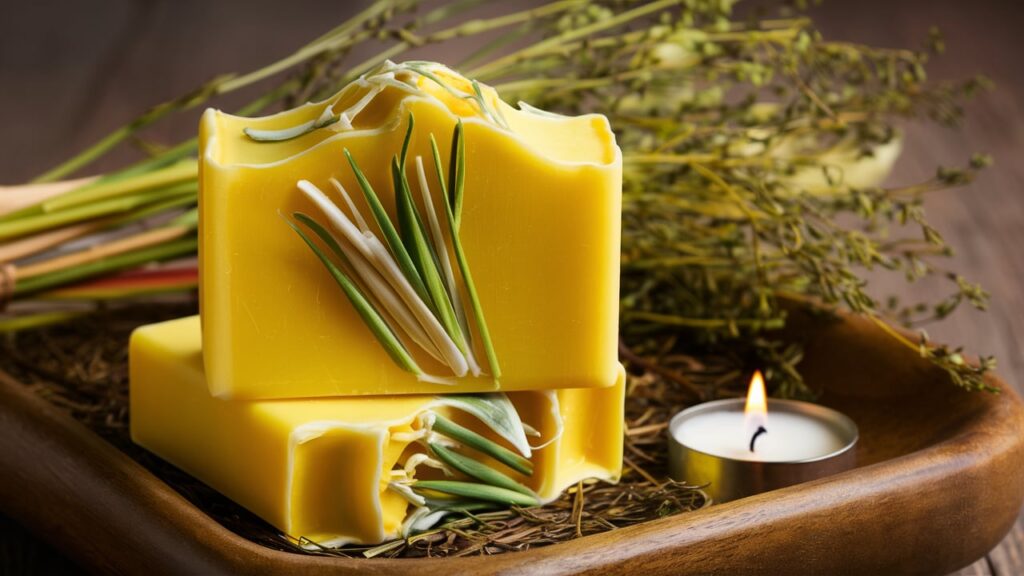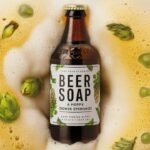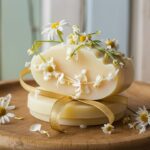- Lemongrass soap is a type of soap that is made with lemongrass essential oil or infused with lemongrass leaves.
- The essential oil soap is known for its refreshing aroma and potential benefits for the skin.
- It is also a natural astringent, which helps tighten pores and control oil production.
Benefits of lemongrass soap
Antibacterial Properties
Lemongrass soap’s potential for fighting bacteria comes from its essential oil. The oil is rich in citral, a compound with antibacterial and antifungal properties.
Studies have shown that citral in lemongrass inhibits the growth of various bacteria, including Staphylococcus aureus, a common cause of skin infections.
Lemongrass oil may also be effective against fungi like Candida albicans, responsible for yeast infections.
Factors like the amount of lemongrass oil in the soap and the type of bacteria present influence the soap’s effectiveness.
Skin Brightening and Even Tone
Limited evidence suggests lemongrass soap for skin might contribute to a brighter and more even skin tone.
However, lemongrass is not a guaranteed effect and works differently than harsh lightening products.
Lemongrass contains citric acid, which has a mild exfoliating effect. Gentle exfoliation helps remove dead skin cells on the surface, promoting faster skin cell turnover.
As newer, brighter cells come to the forefront, the skin’s overall appearance might look slightly brighter.
Lemongrass doesn’t directly bleach or lighten melanin, the pigment responsible for skin color. Uneven skin tone is caused by sun damage, hyperpigmentation, or other factors. For a significant evening of skin tone, consulting a dermatologist is recommended.
Soap Secrets: Why Homemade Soaps Are Your Skin’s New Best Friend
Rich in Vitamin C
According to the USDA National Nutrient Database, a tablespoon of raw lemongrass only provides about 0.12 milligrams of vitamin C.
However, the amount is likely too low to significantly impact skin through topical application in aromatherapy soap.
Vitamin C is most effective for brightening and firming skin when used in higher concentrations.
Refreshing and Invigorating Scent
Lemongrass essential oil is packed with a compound called citral, which gives lemons and limes their characteristic citrusy aroma. If you’re interested in exploring the benefits of lemongrass for your skin, consider trying a lemongrass soap DIY project to create your own nourishing soap at home.
When inhaled, citral interacts with the olfactory receptors in your nose, triggering a sense of alertness. The uplifting scent is especially helpful in the morning or after a workout when you need a pick-me-up.
Deep Cleansing
Lemongrass essential oil is rich in citral, which helps loosen dirt, oil, and impurities on the skin’s surface.
The oil also acts as a natural astringent. Astringents help tighten pores, minimizing their appearance and preventing them from becoming clogged.
Natural Astringent
Lemongrass soap for oily skin is particularly effective because of its astringent properties that stem from the tannins and other phenolic compounds. These compounds can uniquely interact with proteins and tissues, causing them to constrict slightly. In the context of skin, this translates to a tightening effect on pores.
Smaller pores appear less noticeable, contributing to a smoother and more refined skin texture. Constricted pores are also less likely to trap dirt and oil, which leads to breakouts and blackheads.
Remember that lemongrass soap’s astringency is mild. Unlike harsh astringents that leave skin dry and tight, lemongrass offers a gentle approach.
Dermatological Insights
Dr. Josh Axe, a licensed naturopathic physician, highlights lemongrass’s potential to combat bacteria and fungus contributing to acne and other skin concerns, making it a suitable ingredient for acne [1].
Source: “1” by Dr. Josh Axe (licensed naturopathic physician)
While research is ongoing, studies suggest lemongrass may have antioxidant properties that help reduce signs of aging. Using lemongrass soap for oily skin helps to balance the skin’s natural pH. However, more studies are needed for definitive conclusions.
Source: “1”
Risks:
- Lemongrass essential oil can irritate the skin if not diluted properly. Dermatologist Dr. Corey Hartman emphasizes the importance of proper dilution.
Source: “1”
Dermatologists generally acknowledge the potential benefits of lemongrass but advise caution.
While there’s promising evidence, more research is needed to understand the effects of lemongrass on the skin fully.
user reviews
Based on the search results, here are authentic reviews from real users who have used lemongrass in skincare, emphasizing the importance of using organic soap for a natural and sustainable approach:
-
- Amazon Customer Review 1:
- “Very pleased with this lemongrass oil. It is only a 1 fl oz jar but the scent is strong enough to use with or without diluting with water, perfect for pairing with natural soap for a refreshing skincare routine.”
- YouTube Review 3:
- “So I had the chance to try out products from Lemongrass Spa… And what I tried was amazing.”
- WebMD User Ratings for LEMONGRASS 4:
- Users rated Lemongrass with an average of 4.2 stars out of 5 for side effects, effectiveness, ease of use, and satisfaction.
- Amazon Customer Review 1:
Lemongrass Soap and Your Questions
Is lemongrass soap good for sensitive skin?
Lemongrass essential oil is irritating to sensitive skin. Before using any new soap, patch test it on a small area of your inner arm. Look for lemongrass soap made with gentle carrier oils and marketed for sensitive skin.
Where to buy lemongrass soap?
Natural soap stores: Many stores specializing in natural products carry lemongrass soap. They stock a variety of soaps, including antibacterial soap, which is beneficial for skin health.
Online retailers: Numerous online retailers sell lemongrass soap, from handmade varieties to established brands.
DIY: find recipes for making your lemongrass soap online
Best lemongrass soap brands?
Due to the subjective nature of “best,” it’s difficult to recommend specific brands. Here are tips for choosing:
- Look for brands that use natural and organic ingredients.
- Check reviews from other customers with sensitive skin.
- Consider brands that offer fragrance-free or minimal essential oil blends.
DIY lemongrass soap recipe:
Making soap requires handling lye, which can be dangerous. It’s best for experienced soap makers. Look for trusted online resources with clear instructions and safety precautions.
How to use lemongrass soap for lice prevention?
Lice prefer clean hair, so regular washing with any soap help reduce the chance of lice infestation. However, lemongrass soap isn’t a proven lice-repellent. For lice treatment, consult a healthcare professional.

I’m a devoted organic skincare enthusiast, passionate about the natural, wholesome goodness that organic products bring to our skin.
Organic skincare isn’t just a hobby for me—it’s a lifestyle. Every product I use, recommend, and write about has been carefully chosen for its purity and effectiveness. Everything I write about is backed by scientific studies, dermatologists’ opinions, and user experiences.
I also excel at tackling skincare challenges with innovative, organic solutions.


